Related Research Articles
Antisemitism in Christianity, a form of religious antisemitism, is the feeling of hostility which some Christian Churches, Christian groups, and ordinary Christians have towards the Jewish religion and the Jewish people.
Antisemitism and the New Testament is the discussion of how Christian views of Judaism in the New Testament have contributed to discrimination against Jewish people throughout history and in the present day.

The Wandering Jew is a mythical immortal man whose legend began to spread in Europe in the 13th century. In the original legend, a Jew who taunted Jesus on the way to the Crucifixion was then cursed to walk the Earth until the Second Coming. The exact nature of the wanderer's indiscretion varies in different versions of the tale, as do aspects of his character; sometimes he is said to be a shoemaker or other tradesman, while sometimes he is the doorman at the estate of Pontius Pilate.
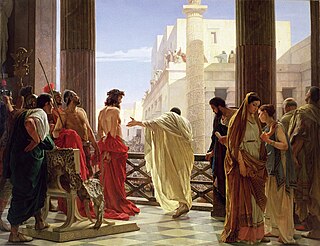
Pontius Pilate was the fifth governor of the Roman province of Judaea, serving under Emperor Tiberius from 26/27 to 36/37 AD. He is best known for being the official who presided over the trial of Jesus and ultimately ordered his crucifixion. Pilate's importance in modern Christianity is underscored by his prominent place in both the Apostles' and Nicene Creeds. Due to the Gospels' portrayal of Pilate as reluctant to execute Jesus, the Ethiopian Church believes that Pilate became a Christian and venerates him as both a martyr and a saint, a belief which is historically shared by the Coptic Church.

In Christianity, the Passion is the short final period in the life of Jesus Christ.
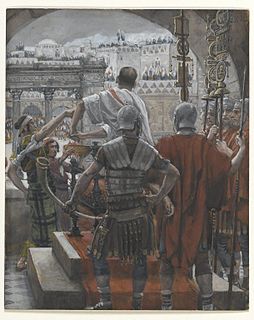
The term "blood curse" refers to a New Testament passage from the Gospel of Matthew, which describes events taking place in Pilate's court before the crucifixion of Jesus and specifically the apparent willingness of the Jewish crowd to accept liability for Jesus' death.
Robin Hood and the Tanner is Child ballad 126. It is a late seventeenth-century English broadside ballad and one of several ballads about the medieval folk hero Robin Hood that form part of the Child ballad collection, which is one of the most comprehensive collections of traditional English ballads but has now been subsumed and surpassed by the Roud Folk Song Index.
Robin Hood and the Butcher is a story in the Robin Hood canon which has survived as, among other forms, a late seventeenth-century English broadside ballad, and is one of several ballads about the medieval folk hero that form part of the Child ballad collection, which is one of the most comprehensive collections of traditional English ballads. It may have been derived from the similar Robin Hood and the Potter.
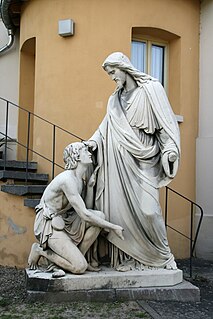
Each of the three Synoptic Gospels tells of Jesus healing the blind near Jericho, as he passed through that town, shortly before his passion.
Elene is a poem in Old English, that is sometimes known as Saint Helena Finds the True Cross. It was translated from a Latin text and is the longest of Cynewulf's four signed poems. It is the last of six poems appearing in the Vercelli manuscript, which also contains The Fates of the Apostles, Andreas, Soul and Body I, the Homiletic Fragment I and Dream of the Rood. The poem is the first English account of the finding of the Holy Cross by Saint Helena, the mother of Emperor Constantine. The poem was written by Cynewulf some time between 750 and the tenth century. It is written in a West Saxon dialect, but certain Anglianisms and metrical evidence concerning false rhymes suggest it was written in an Anglian rather than Saxon dialect. It is 1,321 lines long.

This is a glossary of terms used in Christianity.
Jewish deicide is the notion that the Jews as a people will always be collectively responsible for the killing of Jesus, even through the successive generations following his death. A Biblical justification for the charge of Jewish deicide is derived from Matthew 27:24–25. Some rabbinical authorities, such as Maimonides and, more recently, Zvi Yehuda Kook have asserted that Jesus was indeed stoned and hanged after being sentenced to death in a rabbinical court.
The Wicked Son: Anti-Semitism, Jewish self-hatred, and the Jews is a collection of essays by playwright David Mamet, published by Nextbook/Schocken in 2006.

The burial of Jesus refers to the burial of the body of Jesus after crucifixion, before the eve of the sabbath described in the New Testament. According to the canonical gospel accounts, he was placed in a tomb by a councillor of the sanhedrin named Joseph of Arimathea. In art, it is often called the Entombment of Christ.

The relations between Pope Pius XII and Judaism have long been controversial, especially those questions that surround Pope Pius XII and the Holocaust. Other issues involve Pius's Jewish friendships and his attitude towards the new state of Israel.
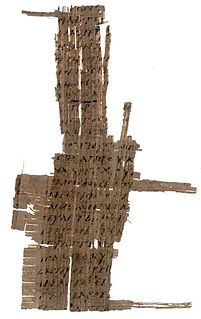
Galatians 2 is the second chapter of the Epistle to the Galatians in the New Testament of the Christian Bible. It is authored by Paul the Apostle for the churches in Galatia, written between 49 and 58 CE. This chapter contains the meeting account of Paul, Barnabas and Christians in Jerusalem, considered "one of the most momentous events in the earliest Christianity", and the dispute between Paul and Peter.
"A free admonition without any fees / To warne the Papistes to beware of three trees" is an English broadside ballad published by William Birch in 1571 and is not currently set to any tune An original copy of the ballad is located in the Huntington Library, however online facsimiles are available for public consumption.
The Wandering Jew's Chronicle is an English broadside ballad dating back to the 17th century, with The Wandering Jew as its narrator. From the point of view of the titular character, this ballad tells the history of the English monarchs, beginning with William the Conqueror, and continuing through King Charles II in early versions, and King George II in later versions. The ballad, according to Giles Bergel, dates back to an initial publication of 1634. Copies of the ballad can be found at the British Library and Magdalene College. Online facsimiles of the text are also available for public consumption.

2 Thessalonians 1 is the first chapter of the Second Epistle to the Thessalonians in the New Testament of the Christian Bible. Traditionally, it is believed to have been written for the church in Thessalonica by Apostle Paul, likely in Corinth shortly after the first epistle, although there were debatable claims that it is the work of a secondary imitator after Paul's death. This chapter contains the prescript, thanksgiving and a message of encouragement for the recipients.
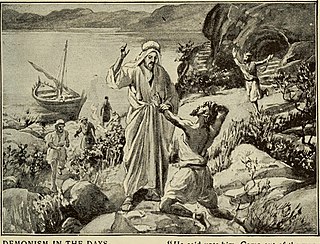
Matthew 12:43-45 is a passage comprising the 43rd to 45th verses in the twelfth chapter of the Gospel of Matthew in the New Testament.